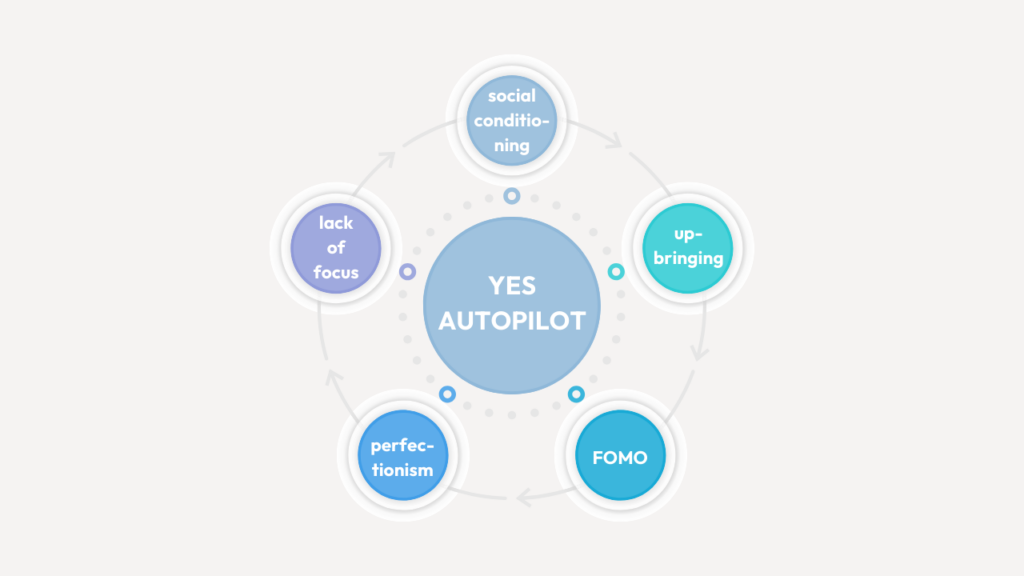Have you ever found yourself saying yes to something, even when deep down you knew you didn’t have the time or energy?
Many of us struggle with setting boundaries. It can feel like we’re stuck on a “Yes Autopilot”, automatically agreeing to requests without fully considering the consequences.
Over time, this can leave us feeling exhausted and frustrated, wondering why we never seem to have enough time for the things that really matter.
Setting boundaries is hard. From an early age, we’re taught to be kind, helpful, and generous. And while these are admirable traits, they can make it difficult to say no when someone asks for help. As a result, we often end up prioritizing others’ needs over our own, even when it comes at a personal cost.
Why We Keep Saying Yes
By constantly saying yes, you can find ourselves stuck in a cycle of overcommitment. Yet, despite the negative effects, many of us struggle with setting clear boundaries. Why?

Here are five common reasons why we keep saying yes:
- Social conditioning. We tend to link our identity with our achievements. Helping someone means you’re valuable, being available means you’re a good friend, organizing a work event means you’re a team player.
- Perfectionism. We often want to bring our absolute best to everyone and everything we set out to do, and as a result we’d rather try to manage the extra stress rather than let someone else down.
- Upbringing. If you grew up in an environment where boundaries weren’t respected or encouraged as a child, you may struggle to establish them as an adult.
- Lack of focus. When we’re unsure of our own priorities, saying yes to everything can give us the illusion of productivity, even though it leaves little room for what truly matters.
- FOMO. The fear of missing out often drives us to overcommit. What if something exciting happens while you’re not there? What if others bond without you? The fear of missing out often drives us to overcommit.
Saying yes too often can drain your mental energy and leave you without the focus needed to pursue your own ambitions. Eventually, this can lead to burnout and even resentment toward the very people we agreed to help, blaming them for your own lack of productivity.
We end up feeling stuck—busy but unfulfilled, always moving but never truly progressing. We might even start ruminating, avoiding other people, overthinking everything. Although it’s rooted in a genuine need for human connection and being valued, the Yes Autopilot is unsustainable.
How to set boundaries
A boundary is like an invisible line that defines what is and isn’t acceptable in your life. And while these lines aren’t fixed—often shifting depending on your priorities, relationships, or mental states—they’re essential for protecting your time and energy.
Recognizing when and where to draw these lines takes time and practice, but it’s well worth the effort. Research suggests that better boundaries mean better self-esteem, more mental energy, and a stronger sense of personal agency.
Here are four simple steps you can take to start setting better boundaries and break free from the Yes Autopilot:
- Define your priorities. Start by identifying what truly matters to you at the moment. Is it your family? Your career? Your health? Once you’re clear on your current priorities, it’s easier to see where you need to draw boundaries. For instance, if saving money is important because you’re starting a business, it might mean saying no to expensive social outings. If finishing a project is your priority, it may mean declining non-essential requests for help.
- Take a step back. When someone asks for your time, pause before agreeing. Ask yourself if this aligns with your priorities or if someone else could assist them. Is the request urgent or important? Often, you’ll realize the request isn’t as critical as it first seems. It’s okay to say you’ll help later, once your own tasks are complete—or to say no altogether.
- Get comfortable with saying no. Of course, it’s easier said than done. But saying no doesn’t mean being rude, and it becomes easier with practice. You can even write down one liners to re-use whenever you’re in such a situation, such as “I would love to help, but I currently have a lot on my plate and won’t be able to give this the attention it deserves.”
- Don’t over explain. Keep your responses brief and to the point. You don’t need to give a lengthy justification for why you can’t help. Most people will respect your honesty and understand that you have your own responsibilities to manage.
If someone reacts negatively to your boundaries, remember that their response reflects more about them than it does about you. They probably have lots to deal with, but it’s not your job to manage other people’s emotions.
However, if it’s someone you are close to and it happens all the time, it may be useful to have a calm conversation to reset their expectations and make your relationship healthier. If it’s a one-time ask and the person acts rude when you say no, just ignore it, move on, and focus on your own priorities.
Learning to set boundaries isn’t about being selfish—it’s about looking after yourself. By protecting your time, energy, and mental well-being, you make room for the things that truly matter to you.
Breaking free from the Yes Autopilot allows you to show up more fully for the people and tasks that align with your priorities, rather than spreading yourself too thin. It’s not easy, but it’s a journey worth taking.
